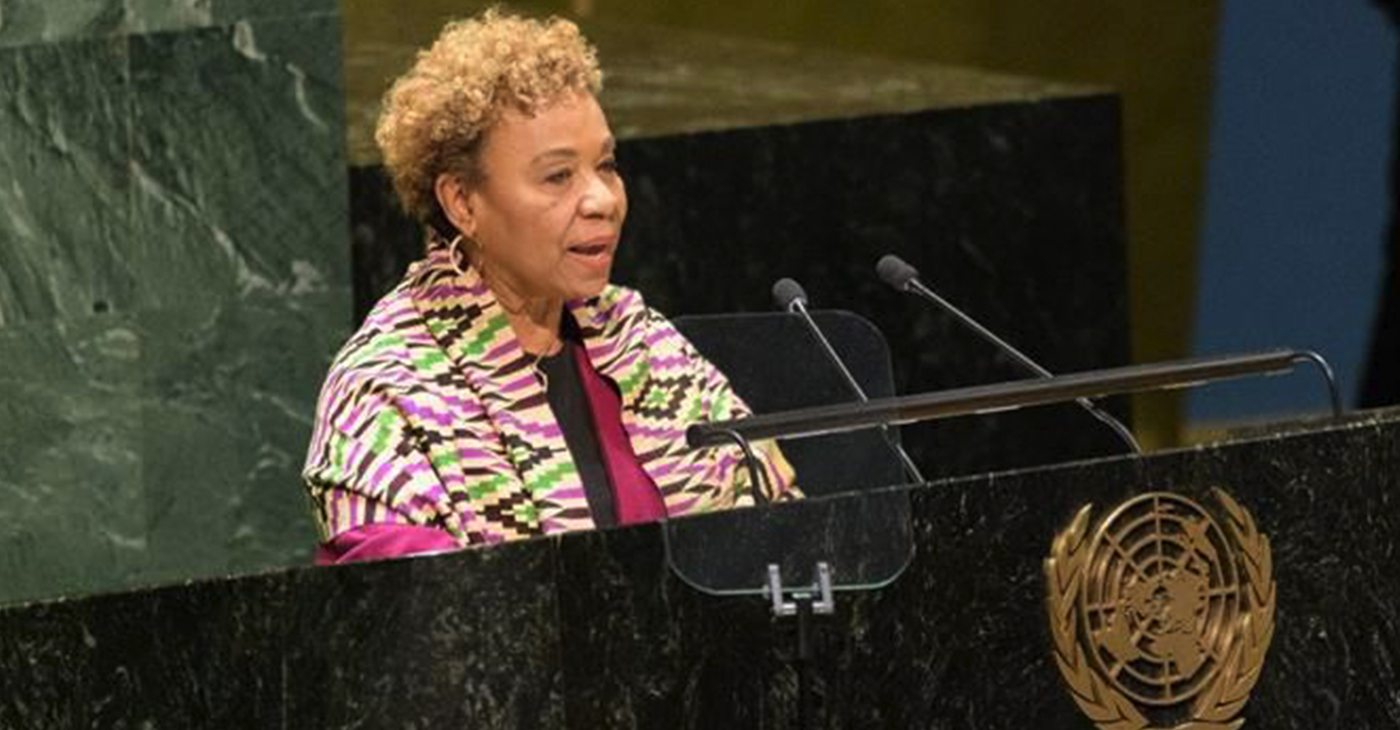Activism
Rep. Barbara Lee Speaks at U.N. Commemoration of Abolition of Slavery, Transatlantic Slave Trade
Lee is one of few members of Congress to have delivered remarks on behalf of the United States at the General Assembly.

Congresswoman Barbara Lee, Chair of the Appropriations Subcommittee on State and Foreign Operations and Congressional Representative to the United Nations, delivered remarks Tuesday at the United Nations General Assembly Plenary Meeting on the Commemoration of the Abolition of Slavery and the Transatlantic Slave Trade.
Lee is one of few members of Congress to have delivered remarks on behalf of the United States at the General Assembly. A full video and transcript of her remarks can be found below.
Full remarks: https://www.youtube.com/watch?v=T5_jHrzj7Ec
“Good morning. Thank you, Mr. President, and thank you, Mr. Secretary General.
“Mr. President, I have the unique honor of addressing you on this important occasion as both a Member of Congress and one of this year’s United States Congressional Delegates to the United Nations General Assembly.
As we commemorate the abolition of slavery and the transatlantic slave trade, let us reflect on the profound words of self-emancipated enslaved person, abolitionist, orator, global luminary, and diplomat, Frederick Douglass.
“Abolition of slavery,” he said, “had been the deepest desire and great labor of my life.” These words prompt our remembrance of the victims and descendants of slavery and the transatlantic slave trade.
“The transatlantic slave trade forced millions of people from their homes, families, societies, and countries, and subjected them to exploitation and dehumanization, creating a global enterprise of unparalleled wealth for Western nations and fueling the global economy. Chattel slavery remains an immoral and indelible stain on the history of the United States, the Western hemisphere, and the collective chronicle of our inhumanity.
“We acknowledge the myriad atrocities of slavery, and continue to grapple with the racial, ethnic, gender, economic, social, and political hierarchies it created. And yes, we must honor the victims of slavery by dismantling its institutional remnants, such as racism, discrimination, economic inequity, marginalization, and systematic underdevelopment.
“The United States must address the multidimensional legacies of slavery through an unprecedented commitment to racial equity, justice, and inclusion within our borders and throughout our global affairs.
“We have demonstrated our commitment nationally through a government-wide approach to addressing systemic inequity. Today, the President of the United States, Joseph R. Biden, will sign the Emmett Till Antilynching Act of 2022, recently passed by the United States Congress.
“It has been over 120 years since Congress’ first attempt to criminalize the horrendous act of lynching and yes, today, it will be finally made a federal hate crime.
“Members of both House and Senate have supported legislation that acknowledges and address the remnants of our racialized past stemming from the institution of chattel slavery.
“Legislation like H. Con. Res. 19, urging the establishment of a United States Commission on Truth, Racial Healing, and Transformation; H.R. 40, a Commission to Study and Develop Reparation Proposals for African Americans; and H.R. 1280, the George Floyd Justice in Policing Act are all examples of how Congress is grappling with the need for systemic change and redress.
“And last year, President Biden signed into law, making Juneteenth – that’s June 19th – a national holiday. It was on this day in 1865, that Union soldiers arrived in Texas to announce that Black people were free. Now, this was two-and-a-half years after the Emancipation Proclamation. This announcement was made in Galveston, Texas, which is the home of my grandfather and my great-grandmother.
“Now on the global stage, we championed the establishment of the Permanent Forum on People of African Descent and supported the International Independent Expert Mechanism to Advance Racial Justice and Equality in Law Enforcement.
“And I, personally, fought for our participation in the movement to establish the beautiful Permanent Memorial Honoring the Victims of Slavery and the Transatlantic Slave Trade right here in a prominent spot at the United Nations. And I was honored to witness the establishment of the International Decade for People of African Descent.
“Despite these promising efforts, there is still so much work to do to achieve full equity in the United States and globally. And so, we must embrace this momentous occasion as a clarion and dynamic call to engage and to move forward.
“Thank you very much.”
Activism
Oakland Post: Week of April 17 – 23, 2024
The printed Weekly Edition of the Oakland Post: Week of April 17 – 23, 2024

To enlarge your view of this issue, use the slider, magnifying glass icon or full page icon in the lower right corner of the browser window. ![]()
Activism
Oakland Schools Honor Fred Korematsu Day of Civil Liberties
Every Jan. 30, OUSD commemorates the legacy of Fred Korematsu, an Oakland native, a Castlemont High School graduate, and a national symbol of resistance, resilience, and justice. His defiant stand against racial injustice and his unwavering commitment to civil rights continue to inspire the local community and the nation. Tuesday was “Fred Korematsu Day of Civil Liberties and the Constitution” in the state of California and a growing number of states across the country.

By Post Staff
Every Jan. 30, OUSD commemorates the legacy of Fred Korematsu, an Oakland native, a Castlemont High School graduate, and a national symbol of resistance, resilience, and justice.
His defiant stand against racial injustice and his unwavering commitment to civil rights continue to inspire the local community and the nation. Tuesday was “Fred Korematsu Day of Civil Liberties and the Constitution” in the state of California and a growing number of states across the country.
One OUSD school is named in his honor: Fred T. Korematsu Discovery Academy (KDA) elementary in East Oakland.
Several years ago, founding KDA Principal Charles Wilson, in a video interview with anti-hate organization “Not In Our Town,” said, “We chose the name Fred Korematsu because we really felt like the attributes that he showed in his work are things that the children need to learn … that common people can stand up and make differences in a large number of people’s lives.”
Fred Korematsu was born in Oakland on Jan. 30, 1919. His parents ran a floral nursery business, and his upbringing in Oakland shaped his worldview. His belief in the importance of standing up for your rights and the rights of others, regardless of race or background, was the foundation for his activism against racial prejudice and for the rights of Japanese Americans during World War II.
At the start of the war, Korematsu was turned away from enlisting in the National Guard and the Coast Guard because of his race. He trained as a welder, working at the docks in Oakland, but was fired after the bombing of Pearl Harbor in 1941. Fear and prejudice led to federal Executive Order 9066, which forced more than 120,000 Japanese Americans out of their homes and neighborhoods and into remote internment camps.
The 23-year-old Korematsu resisted the order. He underwent cosmetic surgery and assumed a false identity, choosing freedom over unjust imprisonment. His later arrest and conviction sparked a legal battle that would challenge the foundation of civil liberties in America.
Korematsu’s fight culminated in the Supreme Court’s initial ruling against him in 1944. He spent years in a Utah internment camp with his family, followed by time living in Salt Lake City where he was dogged by racism.
In 1976, President Gerald Ford overturned Executive Order 9066. Seven years later, the 9th Circuit Court of Appeals in San Francisco vacated Korematsu’s conviction. He said in court, “I would like to see the government admit that they were wrong and do something about it so this will never happen again to any American citizen of any race, creed, or color.”
Korematsu’s dedication and determination established him as a national icon of civil rights and social justice. He advocated for justice with Rosa Parks. In 1998, President Bill Clinton gave him the Presidential Medal of Freedom saying, “In the long history of our country’s constant search for justice, some names of ordinary citizens stand for millions of souls … To that distinguished list, today we add the name of Fred Korematsu.”
After Sept. 11, 2001, Korematsu spoke out against hatred and discrimination, saying what happened to Japanese Americans should not happen to people of Middle Eastern descent.
Korematsu’s roots in Oakland and his education in OUSD are a source of great pride for the city, according to the school district. His most famous quote, which is on the Korematsu elementary school mural, is as relevant now as ever, “If you have the feeling that something is wrong, don’t be afraid to speak up.”
Activism
WOMEN IMPACTING THE CHURCH AND COMMUNITY
Juanita Matthews, better known as “Sister Teacher,” is a walking Bible scholar. She moved to California from the great state of Arkansas in 1971. Sister Teacher has a passion for teaching. She has been a member of Bible Fellowship Missionary Baptist Church since 1971.

Sister Juanita Matthews
55 Years with Oakland Public School District
The Teacher, Mother, Community Outreach Champion, And Child of God
Juanita Matthews, better known as “Sister Teacher,” is a walking Bible scholar. She moved to California from the great state of Arkansas in 1971. Sister Teacher has a passion for teaching. She has been a member of Bible Fellowship Missionary Baptist Church since 1971. She followed her passion for teaching, and in 1977 became the lead teacher for Adult Class #6. Her motto still today is “Once My Student, Always My Student”.
Beyond her remarkable love for the Lord, Sister Teacher has showcased her love for teaching by working for the Oakland Unified School District for 55 years, all but four of those years spent at Emerson Elementary and Child Development School. She truly cares about her students, making sure they have the tools/supplies needed to learn either at OUSD or Bible Fellowship Missionary Baptist Church.
She’s also had a “Clothes Closet Ministry” for 51 years, making sure her students have sufficient clothing for school. The Clothes Closet Ministry extends past her students, she has been clothing the community for over 50 years as well. She loves the Lord and is a servant on a mission. She is a loving mother to two beautiful children, Sandra and Andre. This is the impact this woman of God has on her church and the community.
-

 Activism4 weeks ago
Activism4 weeks agoOakland Post: Week of March 27 – April 2, 2024
-

 #NNPA BlackPress4 weeks ago
#NNPA BlackPress4 weeks agoCOMMENTARY: D.C. Crime Bill Fails to Address Root Causes of Violence and Incarceration
-

 #NNPA BlackPress4 weeks ago
#NNPA BlackPress4 weeks agoMayor, City Council President React to May 31 Closing of Birmingham-Southern College
-

 #NNPA BlackPress4 weeks ago
#NNPA BlackPress4 weeks agoBeloved Actor and Activist Louis Cameron Gossett Jr. Dies at 87
-

 Community1 week ago
Community1 week agoFinancial Assistance Bill for Descendants of Enslaved Persons to Help Them Purchase, Own, or Maintain a Home
-

 Activism3 weeks ago
Activism3 weeks agoOakland Post: Week of April 3 – 6, 2024
-

 Business1 week ago
Business1 week agoV.P. Kamala Harris: Americans With Criminal Records Will Soon Be Eligible for SBA Loans
-

 Activism2 weeks ago
Activism2 weeks agoOakland Post: Week of April 10 – 16, 2024






















































